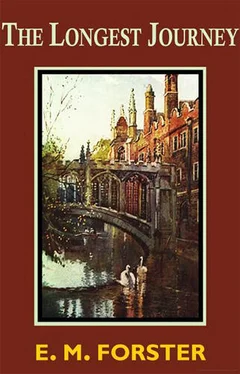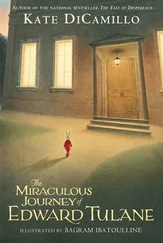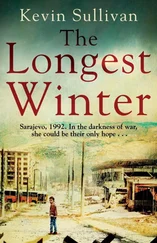Edward Forster - The Longest Journey
Здесь есть возможность читать онлайн «Edward Forster - The Longest Journey» весь текст электронной книги совершенно бесплатно (целиком полную версию без сокращений). В некоторых случаях можно слушать аудио, скачать через торрент в формате fb2 и присутствует краткое содержание. Жанр: Классическая проза, на английском языке. Описание произведения, (предисловие) а так же отзывы посетителей доступны на портале библиотеки ЛибКат.
- Название:The Longest Journey
- Автор:
- Жанр:
- Год:неизвестен
- ISBN:нет данных
- Рейтинг книги:5 / 5. Голосов: 1
-
Избранное:Добавить в избранное
- Отзывы:
-
Ваша оценка:
- 100
- 1
- 2
- 3
- 4
- 5
The Longest Journey: краткое содержание, описание и аннотация
Предлагаем к чтению аннотацию, описание, краткое содержание или предисловие (зависит от того, что написал сам автор книги «The Longest Journey»). Если вы не нашли необходимую информацию о книге — напишите в комментариях, мы постараемся отыскать её.
The Longest Journey — читать онлайн бесплатно полную книгу (весь текст) целиком
Ниже представлен текст книги, разбитый по страницам. Система сохранения места последней прочитанной страницы, позволяет с удобством читать онлайн бесплатно книгу «The Longest Journey», без необходимости каждый раз заново искать на чём Вы остановились. Поставьте закладку, и сможете в любой момент перейти на страницу, на которой закончили чтение.
Интервал:
Закладка:
Mr. Wilbraham passed them in his dog-cart, and lifted his hat to his employer's nephew. Stephen he ignored: he could not find him on the map.
"Good morning," said Rickie. "What a lovely morning!"
"I say," called the other, "another child dead!" Mr. Wilbraham, who had seemed inclined to chat, whipped up his horse and left them.
"There goes an out and outer," said Stephen; and then, as if introducing an entirely new subject—"Don't you think Flea Thompson treated me disgracefully?"
"I suppose he did. But I'm scarcely the person to sympathize." The allusion fell flat, and he had to explain it. "I should have done the same myself,—promised to be away two hours, and stopped four."
"Stopped-oh—oh, I understand. You being in love, you mean?"
He smiled and nodded.
"Oh, I've no objection to Flea loving. He says he can't help it. But as long as my fists are stronger, he's got to keep it in line."
"In line?"
"A man like that, when he's got a girl, thinks the rest can go to the devil. He goes cutting his work and breaking his word. Wilbraham ought to sack him. I promise you when I've a girl I'll keep her in line, and if she turns nasty, I'll get another."
Rickie smiled and said no more. But he was sorry that any one should start life with such a creed—all the more sorry because the creed caricatured his own. He too believed that life should be in a line—a line of enormous length, full of countless interests and countless figures, all well beloved. But woman was not to be "kept" to this line. Rather did she advance it continually, like some triumphant general, making each unit still more interesting, still more lovable, than it had been before. He loved Agnes, not only for herself, but because she was lighting up the human world. But he could scarcely explain this to an inexperienced animal, nor did he make the attempt.
For a long time they proceeded in silence. The hill behind Cadover was in harvest, and the horses moved regretfully between the sheaves. Stephen had picked a grass leaf, and was blowing catcalls upon it. He blew very well, and this morning all his soul went into the wail. For he was ill. He was tortured with the feeling that he could not get away and do—do something, instead of being civil to this anaemic prig. Four hours in the rain was better than this: he had not wanted to fidget in the rain. But now the air was like wine, and the stubble was smelling of wet, and over his head white clouds trundled more slowly and more seldom through broadening tracts of blue. There never had been such a morning, and he shut up his eyes and called to it. And whenever he called, Rickie shut up his eyes and winced.
At last the blade broke. "We don't go quick, do we" he remarked, and looked on the weedy track for another.
"I wish you wouldn't let me keep you. If you were alone you would be galloping or something of that sort."
"I was told I must go your pace," he said mournfully. "And you promised Miss Pembroke not to hurry."
"Well, I'll disobey." But he could not rise above a gentle trot, and even that nearly jerked him out of the saddle.
"Sit like this," said Stephen. "Can't you see like this?" Rickie lurched forward, and broke his thumb nail on the horse's neck. It bled a little, and had to be bound up.
"Thank you—awfully kind—no tighter, please—I'm simply spoiling your day."
"I can't think how a man can help riding. You've only to leave it to the horse so!—so!—just as you leave it to water in swimming."
Rickie left it to Dido, who stopped immediately.
"I said LEAVE it." His voice rose irritably. "I didn't say 'die.' Of course she stops if you die. First you sit her as if you're Sandow exercising, and then you sit like a corpse. Can't you tell her you're alive? That's all she wants."
In trying to convey the information, Rickie dropped his whip. Stephen picked it up and rammed it into the belt of his own Norfolk jacket. He was scarcely a fashionable horseman. He was not even graceful. But he rode as a living man, though Rickie was too much bored to notice it. Not a muscle in him was idle, not a muscle working hard. When he returned from the gallop his limbs were still unsatisfied and his manners still irritable. He did not know that he was ill: he knew nothing about himself at all.
"Like a howdah in the Zoo," he grumbled. "Mother Failing will buy elephants." And he proceeded to criticize his benefactress. Rickie, keenly alive to bad taste, tried to stop him, and gained instead a criticism of religion. Stephen overthrew the Mosaic cosmogony. He pointed out the discrepancies in the Gospels. He levelled his wit against the most beautiful spire in the world, now rising against the southern sky. Between whiles he went for a gallop. After a time Rickie stopped listening, and simply went his way. For Dido was a perfect mount, and as indifferent to the motions of Aeneas as if she was strolling in the Elysian fields. He had had a bad night, and the strong air made him sleepy. The wind blew from the Plain. Cadover and its valley had disappeared, and though they had not climbed much and could not see far, there was a sense of infinite space. The fields were enormous, like fields on the Continent, and the brilliant sun showed up their colours well. The green of the turnips, the gold of the harvest, and the brown of the newly turned clods, were each contrasted with morsels of grey down. But the general effect was pale, or rather silvery, for Wiltshire is not a county of heavy tints. Beneath these colours lurked the unconquerable chalk, and wherever the soil was poor it emerged. The grassy track, so gay with scabious and bedstraw, was snow-white at the bottom of its ruts. A dazzling amphitheatre gleamed in the flank of a distant hill, cut for some Olympian audience. And here and there, whatever the surface crop, the earth broke into little embankments, little ditches, little mounds: there had been no lack of drama to solace the gods.
In Cadover, the perilous house, Agnes had already parted from Mrs. Failing. His thoughts returned to her. Was she, the soul of truth, in safety? Was her purity vexed by the lies and selfishness? Would she elude the caprice which had, he vaguely knew, caused suffering before? Ah, the frailty of joy! Ah, the myriads of longings that pass without fruition, and the turf grows over them! Better men, women as noble—they had died up here and their dust had been mingled, but only their dust. These are morbid thoughts, but who dare contradict them? There is much good luck in the world, but it is luck. We are none of us safe. We are children, playing or quarreling on the line, and some of us have Rickie's temperament, or his experiences, and admit it.
So he mused, that anxious little speck, and all the land seemed to comment on his fears and on his love.
Their path lay upward, over a great bald skull, half grass, half stubble. It seemed each moment there would be a splendid view. The view never came, for none of the inclines were sharp enough, and they moved over the skull for many minutes, scarcely shifting a landmark or altering the blue fringe of the distance. The spire of Salisbury did alter, but very slightly, rising and falling like the mercury in a thermometer. At the most it would be half hidden; at the least the tip would show behind the swelling barrier of earth. They passed two elder-trees—a great event. The bare patch, said Stephen, was owing to the gallows. Rickie nodded. He had lost all sense of incident. In this great solitude—more solitary than any Alpine range—he and Agnes were floating alone and for ever, between the shapeless earth and the shapeless clouds. An immense silence seemed to move towards them. A lark stopped singing, and they were glad of it. They were approaching the Throne of God. The silence touched them; the earth and all danger dissolved, but ere they quite vanished Rickie heard himself saying, "Is it exactly what we intended?"
Читать дальшеИнтервал:
Закладка:
Похожие книги на «The Longest Journey»
Представляем Вашему вниманию похожие книги на «The Longest Journey» списком для выбора. Мы отобрали схожую по названию и смыслу литературу в надежде предоставить читателям больше вариантов отыскать новые, интересные, ещё непрочитанные произведения.
Обсуждение, отзывы о книге «The Longest Journey» и просто собственные мнения читателей. Оставьте ваши комментарии, напишите, что Вы думаете о произведении, его смысле или главных героях. Укажите что конкретно понравилось, а что нет, и почему Вы так считаете.












